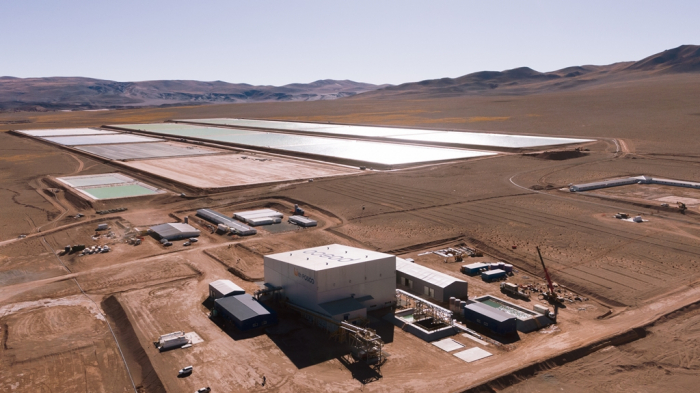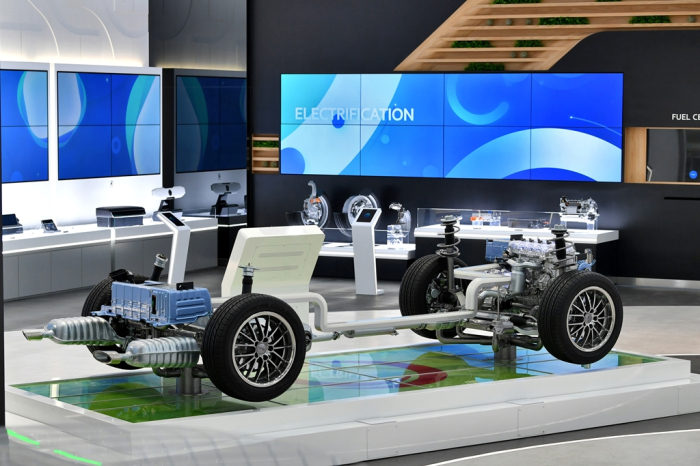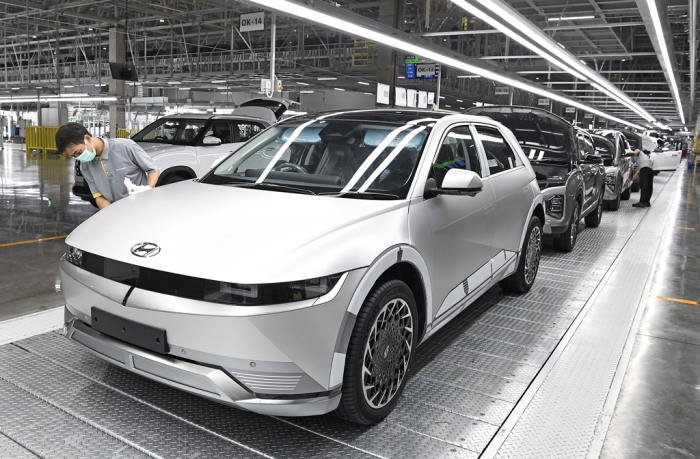Batteries
Hyundai Motor in deal to secure lithium hydroxide from China’s Chengxin
The deal comes as automakers scurry to secure a stable supply of battery materials amid growing resource nationalism
By Jan 11, 2024 (Gmt+09:00)
2
Min read
Most Read
LG Chem to sell water filter business to Glenwood PE for $692 million


KT&G eyes overseas M&A after rejecting activist fund's offer


Kyobo Life poised to buy Japan’s SBI Group-owned savings bank


StockX in merger talks with Naver’s online reseller Kream


Meritz backs half of ex-manager’s $210 mn hedge fund



South Korea’s top automaker Hyundai Motor Group has agreed to secure lithium hydroxide, a key raw material for electric vehicle batteries, from Chinese supplier Shenzhen Chengxin Lithium Group Co. over the next four years.
The Korean automotive group, which owns two car-making units, Hyundai Motor Co. and Kia Corp., has signed a supply agreement with Chengxin and its affiliate Centillion Holdings International Ltd., industry sources said on Thursday.
The deal would mark the first time for Hyundai, as an automaker, to come forward to directly secure a key raw material used in EV batteries.
Under the deal, Hyundai will receive lithium hydroxide from Chengxin’s production base in Chengdu, Sichuan Province, for four years through 2027, sources said. The Chinese company also operates lithium projects in other countries such as Indonesia and Chile.
The contracted volume and the value of the Hyundai-Chengxin deal were not known.

Sichuan is the hub of China’s lithium battery industry, accounting for 28% of the country’s lithium salt production.
Demand for lithium hydroxide as a key raw material in high-nickel cathodes is growing because its mix-in with nickel contributes to higher energy density and better charge-discharge performance in EV batteries.
Chengxin, also known as Shengxin Lithium Energy, said in a public disclosure that its deal with a global automaker recognizes the quality of its lithium hydroxide and strengthens their long-term bilateral partnership.
A Hyundai Motor official would not comment on the deal, saying that “Hyundai has nothing to comment beyond what the Chinese company said in a filing.”
Headquartered in Chengdu, Chengxin Lithium counts Chinese firms BYD and CATL as well as Korea’s LG Chem Ltd., and POSCO Chemical — a POSCO Holdings Inc. unit now renamed as POSCO Future M Co. — among its major clients, according to its website.

STABLE SUPPLY CHAIN
Analysts said the deal comes as global automakers scurry to secure a stable supply of battery materials in response to the US Inflation Reduction Act, which provides tax breaks and other benefits to EV makers and battery suppliers. Companies are eligible for such tax benefits if battery materials are processed into battery cells by US partners in countries outside China.
Hyundai Motor has been striving to strengthen its battery materials supply chain.
In August, it signed an agreement with Korea Zinc Inc. to jointly secure raw materials for nickel and explore new business opportunities such as used-battery recycling.
China is home to the world’s major lithium suppliers, including Ganfeng Lithium Co. and Tianqi Lithium Corp., which have an annual lithium carbonate production capacity of 43,000 tons and 34,500 tons, respectively.
Write to Nan-Sae Bin at binthere@hankyung.com
In-Soo Nam edited this article.
More to Read
-
 BatteriesPOSCO develops EV battery material for lithium extraction
BatteriesPOSCO develops EV battery material for lithium extractionDec 14, 2023 (Gmt+09:00)
1 Min read -
 BatteriesHyundai-invested SES to provide Li-Metal battery B samples, eyes UAM
BatteriesHyundai-invested SES to provide Li-Metal battery B samples, eyes UAMDec 13, 2023 (Gmt+09:00)
3 Min read -
 BatteriesPOSCO completes construction of Korea’s 1st lithium hydroxide plant
BatteriesPOSCO completes construction of Korea’s 1st lithium hydroxide plantNov 29, 2023 (Gmt+09:00)
3 Min read -
 BatteriesSodium-ion batteries emerge as alternative to lithium, LPF batteries
BatteriesSodium-ion batteries emerge as alternative to lithium, LPF batteriesNov 27, 2023 (Gmt+09:00)
3 Min read -
 BatteriesLG Energy triples lithium orders from SQM for US benefits
BatteriesLG Energy triples lithium orders from SQM for US benefitsJul 07, 2023 (Gmt+09:00)
2 Min read
Comment 0
LOG IN


